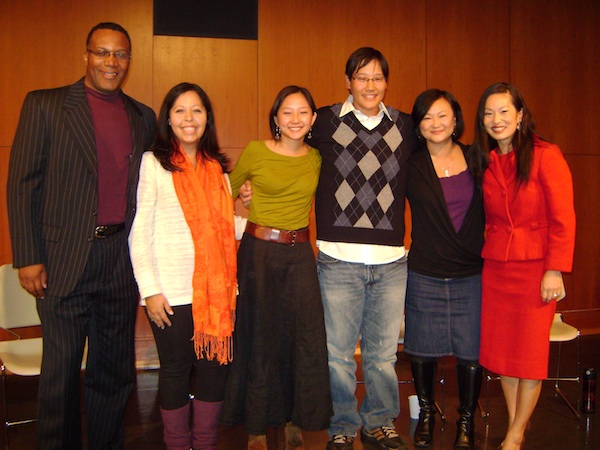
MU forum: What if? An adoptee dilemma
By Rick Shiomi, Mu Performing Arts Mu Performing Arts held its first preproduction community forum related to our mainstage production of Four Destinies by Katie Hae Leo. The play itself looks at the issue of adoption through four different characters of Korean, African American, Latino and Caucasian backgrounds. The forum was held on September 25, 2011 at Macalester College in Saint Paul; it was co-sponsored by the American Studies department at Macalester.
The forum had a number of notable panelists with Soo Jin Pate, an Assistant Professor of English at Minneapolis Community and Technical College, as the moderator. The panelists were: • Oh Myo Kim, a PhD student in Psychology at the University of Minnesota studying issues of race and identity in transracial adoptive families; • Jae Ran Kim, a licensed social worker and PhD candidate in Social Work at the University of Minnesota; • Shawyn Lee, a genderqueer identified Korean adoptee who is a PhD student at the School of Social Work at the U of M; • Robert O’Connor, an African American adoptee who is tenured faculty at Metropolitan State University in the social work department and an independent trainer and consultant with the Federal Resource Center for Adoption’s training and technical assistance team; and • Shandamarie Stracek, an adoptee from Columbia who graduated from St. Cloud State and currently works at General Mills.
Soo Jin began the discussion with a question about “destiny” and how that idea has been used in adoptive families to explain the phenomenon of transracial adoption. The panelists responded by pointing out how that word has come to cover up so many of the realities and complexities of the adoption process, including the tendency to forget or undercut the loss of the initial life and culture of the birth family. And on further exploration, there was a deeper questioning of the system of adoption and the privilege of western nations in relation to other countries.
The following discussion ranged from very personal stories to a larger analysis of the system of adoption and how it needs to be changed. Shandamarie commented on how difficult it was to grow up in central Minnesota as the only Latina in her community, without resources to understand her own racial and cultural background. Robert spoke of his own experience in the foster care system both as a ward of the state and later as state ward administrator and how the system is geared to the needs of the parents and not the children.
All the panelists agreed that the system as it now operates should be changed to be based upon basic truths rather than inherent lies. For example, there has been a demand from some adoptive parents that their adopted children’s births be recognized as being in the United States rather than their actual birth countries. The panelists all agreed that transparency needs to be far greater, with the adoptees having much more access to their own family histories and that potential adoptive parents should have far greater training and understanding before they adopt.
The audience had some questions such as how do the panelists deal with adoptees who say they are not concerned about all this cultural and racial identity tension, and whether they themselves would ever consider adopting children. The panelists agreed that if an individual believed he/she had no quibbles with their adoption, then there’s nothing that needs to be done. However, for them personally, they wondered about anyone who would say they never for a moment wondered about their identity as transracial adoptees. And all the panelists said adopting children themselves would is a difficult decision. Some have considered it as an option for their lives. All said they would think carefully about adopting children in the current system.
In addition, an adoptive mother of two transracial adoptees asked for advice. One child is interested in her birth culture and the other is not. The mother asked how far she should push them now to learn about their birth culture. The panel response was unanimous, with all agreeing that the child should not have to make this choice. Children are made to do things all the time that they don’t want to do, so why should going to culture camp be any different? However, that said, they also agreed that just sending a child to culture camp is not enough. Jae Ron spoke about ‘drive by culture,’ where a child is dropped off at a cultural event/class/camp by parents, comes home, and then never talks in depth about the experience with parents. She said that culture comes from the home – who you invite to dinner, who your friends are, what you eat, what you talk about. Shandamarie spoke about not drawing a line between cultures of birth and adoption. For example, have a dish like paella be one of your family’s favorite foods – not because it’s the food of your adopted child’s birth culture, but because it’s just one of your family’s favorite dinners.
It was quite a remarkable forum that looked at both the personal and systemic issues involved in adoption and gave a tremendous framework for understanding the play.
Four Destinies opens on Oct. 15 and runs Thursdays-Sundays through Oct. 30 at Mixed Blood Theatre. For tickets, call (612) 338-6131 or visit www.muperformingarts.org.
Recent Content
-
Artsarticle ·
-
Artsarticle ·
-
Artsarticle ·
